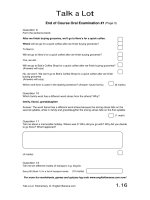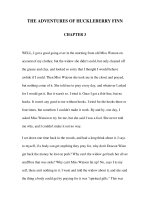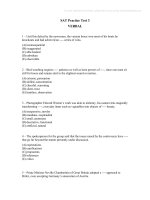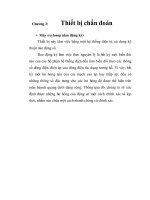Nghĩa trong toeic 3 pptx
Bạn đang xem bản rút gọn của tài liệu. Xem và tải ngay bản đầy đủ của tài liệu tại đây (198.82 KB, 6 trang )
Upload bởi
www.viet-ebook.co.cc Nguyễn Hoàng Cương
Trang 110
a- Phải loại bỏ những câu trả lời bao gồm 1 thành ngữ tuy không sai nhưng dài, trong khi đó lại
có 1 từ khác ngắn hơn để thay thế.
N hưng lưu ý rằng có những phó từ không có hình thức đuôi ly hoặc nếu có sẽ mang nghĩa khác,
nên phải dùng theo cách : một cụm thành ngữ ( những tính từ có đuôi ly)
Ví dụ:
Freshly khác với in a fresh mener (tươi).
Minh hoạ
This food is only delicious when eaten in a fresh mener (khi ăn tươi).
He had a dozen fresh-laid egges (trứng vừa mới đẻ)
b- Phải tránh
những câu trả lời có 2 từ mang cùng một nghĩa (Redundancy)
3. Phải tránh những câu trả lời có những từ vựng không khớp với nghĩa của câu. Đặc biệt là các
ngữ động từ.
4. Tránh những câu trả lời có tiếng lóng.
53. Những từ dễ gây nhầm lẫn
Đó là những từ rất dễ gây nhầm lẫn về mặt ngữ nghĩa, chính tả hoặc cách phát âm.
AN GEL (n) : Thiên thần.
AN GLE (n) : Góc.
CITE (v) : Trích dẫn. In her term paper, Janis had to cite many references.
SITE (n) : Khu đất ( để xây dựng). The corner of N orth Main and Mimosa Streets will be the site
of the new shopping center.
SIGHT (n) : 1- Khe ngắm, tầm ngắm. Through the sight of the rifle, the soldier spotted the
enemy.
(n) 2- cảnh tượng. Whatching the landing of the space’s capsule was a pleasant
sight.
(v) 3- Thấy, quan sát thấy We sighted a ship in the bay.
COSTUME (n) Quần áo, trang phục lễ hội.
Ví dụ:
It is a custom in Western Europe for little boys to wear shorts pants to school.
DECEN T (adj) : 1- đứng đắn, tề chỉnh.
2- tươm tất, tốt
Ví dụ:
When one appears in court, one must wear decent clothing.
DESCEN T (n) :
1- leo xuống, trèo xuống.
Ví dụ:
The mountain climbers found their descent more hazardous than their ascent.
2- nguồn gốc, dòng dõi.
Ví dụ:
Vladimir is of Russian descent.
DESSERT (n) : Món tráng miệng.
Upload bởi
www.viet-ebook.co.cc Nguyễn Hoàng Cương
Trang 111
Ví dụ:
We had apple pie for dessert last night.
DESERT (n) : sa mạc.
Ví dụ:
It is difficult to live in the desert without water.
DESERT (v) : bỏ, bỏ mặc.
Ví dụ:
After deserting the post, the soldier ran away from the camp.
LATER (adv) : sau đó, sau đây, rồi thì (thường dùng với câu ở tương lai).
N gược nghĩa với nó là earlier (được dùng ở simple past).
Ví dụ:
We went to the movies and later had ice cream at Dairy Isle.
THE LATTER >< THE FORMER
Cái thứ 2, người thứ 2 >< cái thứ nhất, người thứ nhất.
Ví dụ:
Germany and England both developed dirigibles for use during World war II, the latter primarily
for coastal reconnaissance. (latter = England).
LOOSE (adj) : lỏng >< tight : chật
Ví dụ:
after dieting, Marcy found that her clothes had become so loose that she had to buy a new
wardrobe.
LOSE (v) : 1- đánh mất, thất lạc.
Ví dụ:
Mary lost her glasses last week.
2- thua, thất bại.
Ví dụ:
If Harry
doesn’t practice his tennis more, he may lose the match.
Passed (v - quá khứ của pass) :
1- trôi qua, qua đi.
Ví dụ:
Five hours passed before the jury reached its verdict.
2- đi qua, đi ngang qua.
Ví dụ:
While we were sitting in the park, several of our friends passed us.
3- thành công, vượt qua được.
Ví dụ:
The students are happy that they passed their exams.
PAST (adj) : 1- đã qua, dĩ vãng.
Ví dụ:
Upload bởi
www.viet-ebook.co.cc Nguyễn Hoàng Cương
Trang 112
This past week has been very hectic for the students returning to the university.
2- trước đây.
Ví dụ:
In the past, he had been a cook, a teacher, and a historian.
PEACE (n) : hoà bình, sự trật tự, sự yên ổn, sự yên lặng, sự thanh bình.
Ví dụ:
Peace was restored to the community after a week of rioting.
PIECE (n) : Một mNu, 1 mảnh.
Ví dụ:
Heidi ate a piece of chocolate cake for dessert.
PRIN CIPAL (n) : 1- hiệu trưởng (trường tiểu học và trung học).
Ví dụ:
The principal called a faculty meeting.
(adj) 2- chính, chủ yếu.
Ví dụ:
An anthropologist, who had worked with the indigenous tribes in Australia, was the principal
speaker at Friday’s luncheon.
PRIN CIPLE (n) : N guyên tắc, luật lệ.
Ví dụ:
Mr. Connors is a man who believes that truthfulness is the best principle.
QUIET (adj) : yên ắng, yên ả, im lặng,tĩnh mịch.
Ví dụ:
The night wa
s so quiet that you could hear the breeze blowing.
QUITE (adv) : 1- hoàn toàn.
Ví dụ:
Louise is quite capable of taking over the household chores while her mother is away.
2- hơi, một chút.
Ví dụ:
He was quite tired after his first day of classes.
QUIT (v) : dừng.
Ví dụ:
Herman quit smoking on his doctor’s advice.
STATION ARY (adj) : cố định, không di chuyển, tĩnh tại.
Ví dụ:
The weatherman said that the warm front would be stationary for several days.
STATION ERY (n) : Giấy viết đặc biệt, văn phòng phNm.
Ví dụ:
Lucille used only monogrammed stationary for correspondence.
Upload bởi
www.viet-ebook.co.cc Nguyễn Hoàng Cương
Trang 113
THAN (liên từ) : được sử dụng trong câu so sánh hơn.
Ví dụ:
Today’s weather is better than yesterday’s.
THEN (adj) : sau đó ( được dùng sau 1 thời điểm đã được đề cập).
Ví dụ:
First, Julie filled out her schedule; then, she paid her fees.
THEIR (adj) : tính từ sở hữu số nhiều.
Ví dụ:
Their team scored the most points during the game.
THERE (adv) : 1- ở đó, ở đằng kia.
Ví dụ:
Look over there between the trees.
2- được sử dụng với be để chỉ ra sự hiện diện, sự có mặt, sự tồn tại.
Ví dụ:
There is a book on the teacher’
s desk.
THEY’RE (đại từ + động từ): viết tắt của they are.
Ví dụ:
They’re leaving on the noon flight to Zurich.
TO (giới từ) : đi tới, cho tới, tới tận lúc.
Ví dụ:
Go to the blackboard and write out the equation.
TWO (n hoặc adj) - hai.
Ví dụ:
Two theories have been proposed to explain that incident.
TOO (adv) 1- quá.
Ví dụ:
This morning was too cold for the children go to swimming.
2- cũng, cũng vậy.
Ví dụ:
Jane went to the movie, and we did too.
WEATHER (n): thời tiết.
Ví dụ:
Our flight was delayed because of bad weather.
WHETHER (liên từ): nên chăng (chỉ ra 1 lựa chọn).
Ví dụ:
Because of gas shortage, we do not know whether we will go away for our vacation or stay home.
WHOSE (đại từ) - tính từ hay đại từ quan hệ sở hữu.
Ví dụ:
The person whose name is drawn first will win the grand prize.
Upload bởi
www.viet-ebook.co.cc Nguyễn Hoàng Cương
Trang 114
WHO’S ( đại từ quan hệ + động từ) : viết tắt của who + is hoặc who + has.
Ví dụ:
Who’s (who is) your new biology professor ?
Scott is the attorney who’s (who has) been reviewing this case.
YOUR (adj) - sở hữu của you.
Ví dụ:
We are all happy about your accepting the position with the company in Baltimore.
YOU’RE (đại từ + động từ) - Viết tắt của you + are.
Ví dụ:
You’re going to enjoy the panorama from the top of the hill.
Các từ có điểm giống nhau dễ nhầm lẫn.
ACCEPT (v) : chấp nhận.
Ví dụ:
Professor Perez will accept the chairmanship of the humanities department.
EXCEPT (gt) : ngoại trừ (1 vật hay 1 người).
Ví dụ:
Everyone is going to the convention exept Bob.
ACCESS (n) : sẵn có, cách truy cập vào.
Ví dụ:
The teacher
had no access to the students’files, which were locked in the principal’s office.
EXCESS (adj) : 1- dồi dào, phong phú, dư thừa.
We paid a surcharge on our excess baggage.
(n) 2- Lượng bổ xung, phụ.
Ví dụ:
The demand for funds was in excess of the actual need.
ADVICE (n) : lời khuyên, tư vấn.
Ví dụ:
If you heed the teacher’s advice, you will do well in your studies.
ADVISE (v) : đưa ra lời khuyên, hoặc tư vấn.
The Congress advised the president against signing the treaty at that time.
AFFECT (v) : Tác động.
Ví dụ:
The doctors wanted to see how the medication would affect the patient.
EFFECT (n) : 1- Kết quả hoặc hậu quả.
Ví dụ:
The children suffered no ill effects from their long plane ride.
(v) 2- Tạo hiệu quả.
Upload bởi
www.viet-ebook.co.cc Nguyễn Hoàng Cương
Trang 115
Ví dụ:
To effect a change in city government we must all vote on Tuesday.
Again (adv): 1 lần nữa, lặp lại ( 1 hành động).
Ví dụ:
Mike wrote to the publishers again, inquiring about his manuscript.
AGAIN ST (giới từ) : 1- chống lại, phản đối ai đó hoặc cái gì đó.
Ví dụ:
The athletic director was against our dancing in the new gym.
2- kề bên, bên cạnh.
Ví dụ:
The boy standing against the piano is my cousin Bill.
ALREADY (adv) : sẵn sàng.
Ví dụ:
Jan’s plane had already landed before we got to the airport.
ALL READY (noun + adj): Đã chNn bị sẵn sàng để làm gì.
Ví dụ:
We are all ready to go boating.
AMON G (giới từ): Chỉ ra mối quan hệ trong (hoặc sự lựa chọn từ) 3 hay nhiều người (nhiểu vật)
- trong số.
Ví dụ:
It was difficult to select a winner from
among so many contestants.
BETWEEN (giới từ) : chỉ ra mối quan hệ (sự lựa chọn) giữa 2 thực thể.
Ví dụ:
Between writing her book and teaching, Mary Ellen had litte time for anything else.
Lưu ý : cấu trúc between and cũng có thể được dùng để chỉ vị trí chính xác của 1 quốc gia nằm
giữa các quốc gia khác.
Ví dụ:
Việtnam lies between China, laos and cambodia.
BESIDE (giới từ) : bên cạnh đó.
Ví dụ:
There is a small table beside the bed.
BESIDES (giới từ hoặc phó từ): ngoài ra, cũng, hơn nữa.
Ví dụ:
I have five hi
story books here besides the four that I left at home.
ASIDE (adv) : đặt sang 1 bên.
Ví dụ:
Harry sets money aside every payday for his daughter’s education.
COMPARE (V) + WITH: so với (để chỉ ra sự giống nhau, sự tương đồng).









